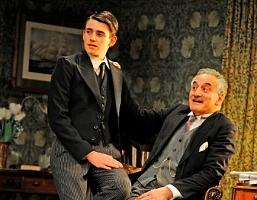The Winslow Boy Review
Based on a real-life case, this classic play is essentially a legal drama, but without the courtroom, wigs, gowns and the rest of the paraphernalia that usually accompanies the genre. In fact, we never even get to see a silhouette of a court building or the whiff of legal briefs, because the play is cleverly set entirely in the living room of the Winslows' home in London between 1912 and 1914. This device enables us to focus not only on the central themes, but also on the interactions between members of the Winslow family, and to analyse their motivations.
When the play opens, fourteen-year-old Ronnie Winslow arrives home having been expelled from the Royal Naval College where he was a cadet. The officers at the college have concluded - without any formal hearing or trial - that he has stolen a five-shilling postal order from one of the other cadets at the college. When his father, Arthur, discovers what has happened he is convinced of his son's innocence and sets about trying to obtain justice and clear his name. During the two-year struggle which follows, Arthur, supported by his daughter Kate explores every avenue to enable his son's case to be heard in court. In the process, Arthur's relatively small amount of capital and income is rapidly consumed, and the family suffer considerably as a result. The eldest Winslow son, Dickie, has to leave Oxford university and daughter Kate loses her fiancé because of the drain on the family funds and the adverse publicity the case attracts. And Arthur's health declines during the proceedings, so that by the end of the play he has to be conveyed round the house in a wheelchair. Each member of the Winslow household has to make sacrifices, though Ronnie seems to be almost oblivious to what is happening around him.
Written by Terence Rattigan, 'The Winslow Boy' is based on the true story of George Archer-Shee's expulsion from the Royal Naval College in 1908 for theft, and which resulted in a protracted legal battle which resulted in the boy being cleared when the court case collapsed in 1910.
In Lindsay Posner's excellent, authoritative production Henry Goodman is in fine form as Arthur Winslow, a retired Westminster Bank employee who sacrifices not only his health but also the family's financial security in his bid to vindicate his son. Though Mr Goodman proves his belief that his son is innocent, when he is challenged by his wife about his motives, he also suggests that pride might also be a motivating factor for his actions. Nick Hendrix is the carefree older son, Dickie, who prefers learning the latest dance than studying; Naomi Frederick is the resolute suffragette daughter, Kate, who stalwartly supports her father in his lengthy struggle against authority; and Charlie Rowe is the young Ronnie who amply demonstrates his fear when having to confront his father with the news of his expulsion at the beginning of the play, but spends most of the second half asleep on the sofa. Peter Sullivan is also hugely impressive as the frosty, arrogant, but brilliant advocate, Sir Robert Morton, who subjects Ronnie to a penetrating and gruelling cross-examination in front of his assembled family, in order to determine his innocence.
Watching this play again, it is hard not to see parallels between the suffering and sacrifices of the Winslow family and those which many families across the globe had to endure during the Second World War. At the time it was first performed in 1946, there must have been many people in the UK who wondered, looking around them at the extensive bomb damage and the bankrupt British economy, and still grieving for loved ones, what the protracted suffering and sacrifice had been all about and whether it had been worth it. In a sense, the answer is encapsulated in the words on a legal instrument which is employed in the play to force the Winslow case to be heard in court - a Petition of Right, on which is written the words "Let right be done". But the phrase also points to the main theme of the play which is that of basic human rights - in particular, the right to justice for every individual. Though Rattigan's work fell out of favour somewhat after the middle of the twentieth century, numerous recent revivals ('Flare Path' and 'The Browning Version' among them) clearly prove that Rattigan's skilfully-crafted work has enduring themes which still resonate with us today.
"Beautifully judged, elegantly designed and splendidly acted production."
Charles Spencer for Daily Telegraph
"A quietly thrilling evening."
Paul Taylor for The Independent
"Lindsay Posner's elegant production makes the play seem funnier than usual, though none of its poise and poignancy is lost."
Henry Hitchings for The Evening Standard
Originally published on
